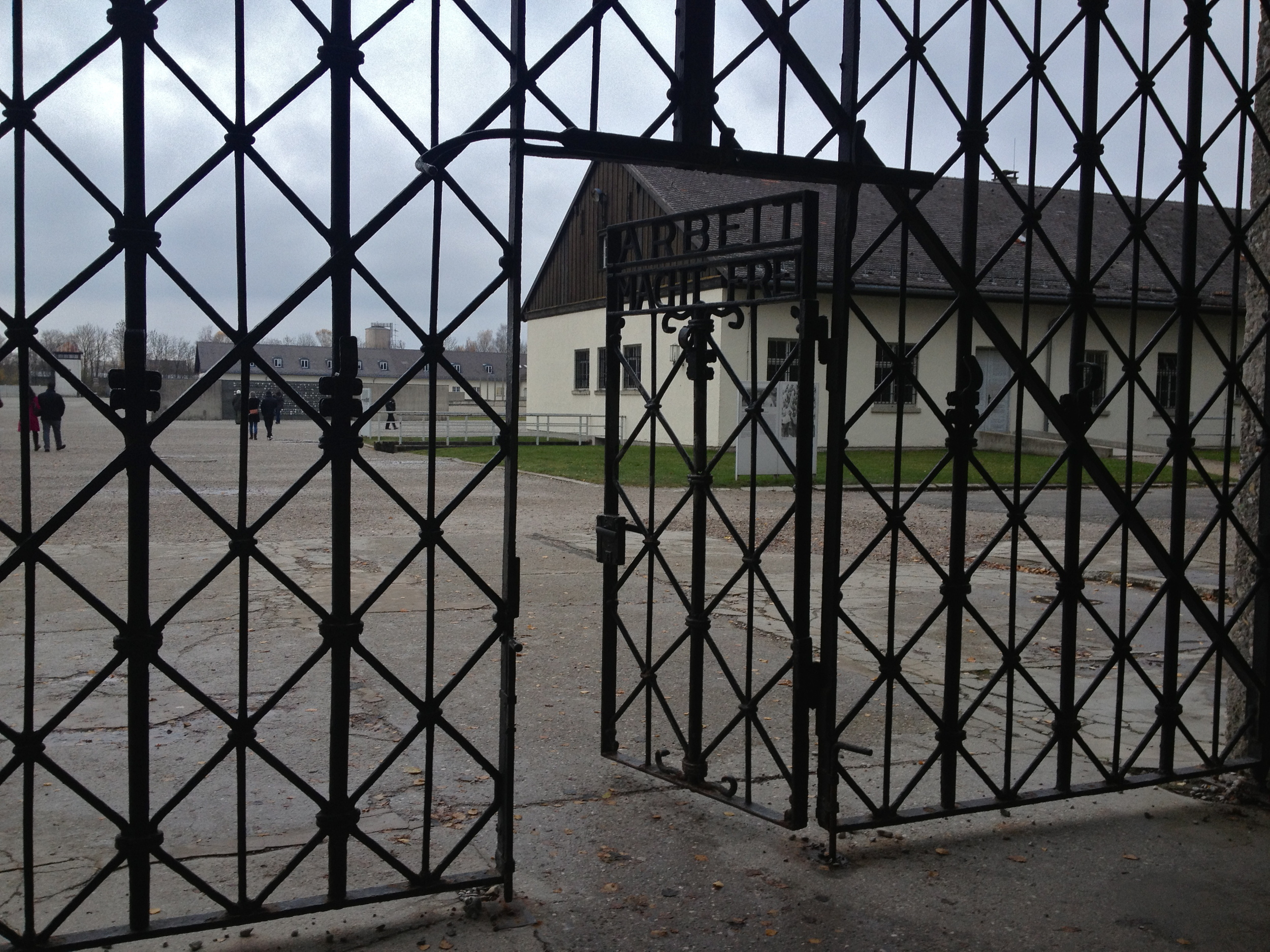Concentration #1: My Train Ride To Dachau
It’s 11:24am, and I’m sitting on the train to Dachau. It’s a gloomy day. It’s one of those days where you never notice it actually raining, and yet the ground is always wet, the sky wears a threatening mask of gray, and the perpetual fear of a sudden downpour lingers over your shoulder like a shadow.
It’s Sunday, November 23, 2013. It’s a gloomy, dreary day, and I’m choosing to be on the train to Dachau.
I’m sitting backwards in a four-person cubby seat, just across from my friend, Abbi, as the train takes off. I’m sitting comfortably. I lean back, stretch my legs, plug in my headphones, turn my iPod on to my “Pondering” playlist, look out the window and take in the view of the German countryside on my three-hour train ride to Dachau.
Just 70 years ago, trains of a very different sort were also headed to Dachau. You couldn’t buy tickets for these trains–or rather you wouldn’t want a ticket on one of these trains–you didn’t want to go where those trains were going. You didn’t choose to go to Dachau.
Seventy years ago the trains heading to Dachau didn’t have comfortable seats like the one I am sitting on now. They didn’t have large windows stretching the length of the car like the one I’m looking out now. They weren’t spacious and filled with laughter, or conversations, or silent individuals reading the daily paper. The trains heading to Dachau 70 years ago weren’t even meant for humans–they were made for cattle.
Seventy years ago these trains were windowless cattle cars. They were human cages used to transport people who had no choice in the matter. Individuals, families, and whole communities were packed into these cars with what little belongings they could carry. They had no information about where they were going, no food or water, and no bathroom. The conditions were atrocious. It was the hope and desire to be reunited with their friends and families that kept their heads up, their hearts light, and their minds off everything else. Without even room to sit, they were transported, sometimes for days, on those trains to Dachau.
As I sit on the train, I try to imagine myself 70 years ago, being stuffed in a cattle car and sent off to Dachau. I close my eyes, and I feel the car getting smaller, hotter and smellier. I feel their suffocation, their uncertainty, their pain, and their fear.
No. Actually, I don’t.
I can’t, and I never will.
But I want to; how sick is that?
Concentration #2: A Note On Pain and Empathy
I know about the Holocaust. I know the facts, and I acknowledge them. In fact, I know quite a bit about the Holocaust, because I studied it in college–I know how real it was, but it’s the reality that scares me. I can learn about what happened, study, work, and devote myself to make sure it doesn’t happen again, but I can’t change what happened. I can’t change that it was real–and that’s what scares me.
I can read the books, hear the testimonies, look at the maps and pictures, but I’ve still always been so far away. There’s always been a paper, professor, or screen cushioning the blow, an “emotional barrier,” if you will; but not this time.
I finally had the opportunity to go to the Dachau Concentration Camp, to see the land where so much hurt took place. There was no emotional barrier this time. There was nothing standing between history and me, and I was ready for it. I was ready and prepared to be emotionally ripped apart.
Throughout the learning and the preparation, I imagined how I would feel being at a place such as Dachau, and as you can probably surmise, it wasn’t pretty. The thought alone would make my stomach churn like only the most unfortunate of circumstances could. I would amplify that feeling by ten, and that’s how I expected to feel while I was actually at the concentration camp. Ironically, however, it was the lack of that feeling that hurt most of all.
When I was on my way to Dachau, I had certain expectations about how emotionally devastating this experience would be for me. I expected to feel a hurt and pain like I had never felt before, like I assume the prisoners of the camp must have felt and possibly still do. But I didn’t have those feelings at all. In fact, it was numbness I felt most of all.
Looking back on this experience, I realize that I had unreasonable expectations. I wanted to feel pain like I’ve never felt before. I wanted to be torn apart emotionally so that I could build myself back up and say I made it. I wanted to share in their suffering, because maybe if I could feel it, really feel it, and understand it, maybe then it would alleviate some of the hurt: their hurt, my hurt. Maybe then I would feel a little better. Now how selfish is that?
More so, looking back on this experience, I realize what I wanted all along: the ability to empathize. In our society when tragedy strikes, as a healing or coping mechanism we often “empathize” with those who have been hurt. We tap into a time when we were faced with a similar situation, and we feel their pain. However, not only do we remember our pain and our memories, but we also know the road to recovery, and whilst it may be painful, we see the light at the end of the tunnel.
But how can you empathize with someone if you can’t fully feel and understand the pain?
I wanted to feel their pain, I wanted to empathize, but I couldn’t and that hurt in a whole other way.
Monument commemorating the evacuation marches of prisoners from the Dachau Concentration Camp. Bronze sculpture by Hubertus von Pilgrim, 1991.
Concentration #3: The Camp Road
In the last section, I discussed my un-met emotional expectations of my trip: how I expected to feel depressed, devastated, and torn apart like I have never felt before, but instead it was a numbness that prevailed.
This numbness lasted for almost the entirety of my visit, but with a few exceptions.
The numbness did not quake when I toured the barracks, or courtyard, or even the gas chambers, like one might expect. Rather, it was when I read about the hope and solidarity in the camp that sent chills through my body. One passage that really touched me was a short excerpt about “The Camp Road.” It read as follows:
After the morning assembly in the block roads the prisoners marched along the camp road to the roll-call area. After work and the evening roll call they returned in closed formation to their barracks. The road lined with poplars was the prisoners’ central meeting place. In the few free hours they had, here they could meet friends from other barracks and exchange information. The “spirit of the camp road,” as the prisoners expressed it, was a symbol of the solidarity amongst the prisoners which developed despite the omnipresent violence.
It was these stories that made me feel more than anything. I could not heal through empathy, because I could not understand the pain. But, if nothing else, I could relate to hope and camaraderie.
It’s stories and details such as this that people need to hear, that the world needs to hear. Despite adversity and violence, humanity prevails.
I can’t help but make a connection to the message here and the mission of PROOF. By not focusing on the fighting, hostility, and pain, but rather on the strength, courage and hope, will we find the road to peace.
While traveling, I just so happened to be reading a book that was more relevant to my experience than I ever could have imagined: The Book Thief, by Markus Zusak. A novel narrated by death and taking place in WWII Germany, each page I turned led to a deeper understanding, connection, or thought I couldn’t shake. The book ends with a reflection from the narrator, a reflection that resonates with me still, and therefore I find worth sharing (I promise, it does not give the book away):
A few cars drove by, each way. Their drivers were Hitlers and Hubermanns, and Maxes, Killers, Dillers, and Steiners…
I wanted to tell the book thief many things, about beauty and brutality. But what could I tell her about those things that she didn’t already know? I wanted to explain that I am constantly overestimating and underestimating the human race–that rarely do I ever simply estimate it. I wanted to ask her how the same thing could be so ugly and so glorious, and its words and stories so damning and brilliant.
None of those things, however, came out of my mouth.
All I was able to do was turn to Liesel Meminger and tell her the only truth I know. I said it to the book thief and I say it now to you.
*** A LAST NOTE FROM YOUR NARRATOR ***
I am haunted by humans.
Concentration #4: A Photograph
While on vacation or traveling, like most tourists, I have always enjoyed taking pictures. I take pictures of everything from ancient ruins and magnificent views, to the most mundane things, things I would never take pictures of at home (but because it’s a stink-bug at the Greek Acropolis and not in New York, I justify it.) I also enjoy getting myself in these pictures. I was once told by a friend, “Don’t take a picture you could buy as a postcard; personalize it.” So, from that point forward, I tried to be sure to get myself in at least one picture each place I went. But Dachau was different.
For the first time, I felt the urge not to take pictures, let alone one with myself in it. It just felt disrespectful and wrong. However, knowing I’d be writing a blog about my experience, I decided to fight the discomfort and snap a few pictures anyway, but I still couldn’t bring myself to pose in one.
As the camp was closing and we were being ushered out, I was standing alone by the gate waiting for my friend, when a bright light from behind me rapidly appeared. Immediately, I looked up and I saw my shadow cast onto the building in front of me. Suddenly, a feeling came over me and, without even thinking, I grabbed my phone, snapped a picture, and just as quickly as my shadow appeared in the light, it disappeared into the darkness. I put my phone back into my pocket and didn’t give the picture much thought. It wasn’t until I got back on the train, pulled out my phone, and was looking through my pictures that I realized what I had captured: a photograph that says all I wanted to say about my experience, all I couldn’t put into words, and all I have yet to figure out. Maybe it’s just me, but I think this picture says it all.
-Emily Masseo

